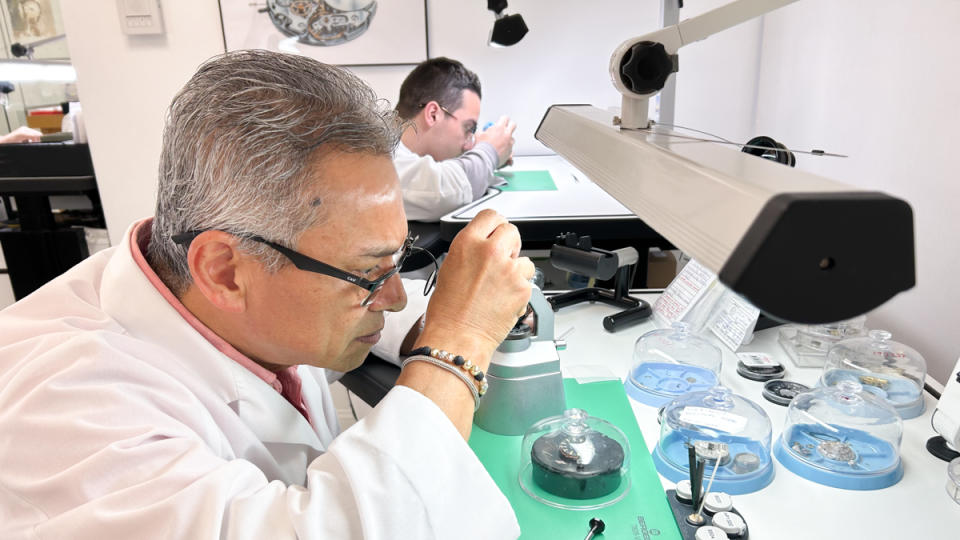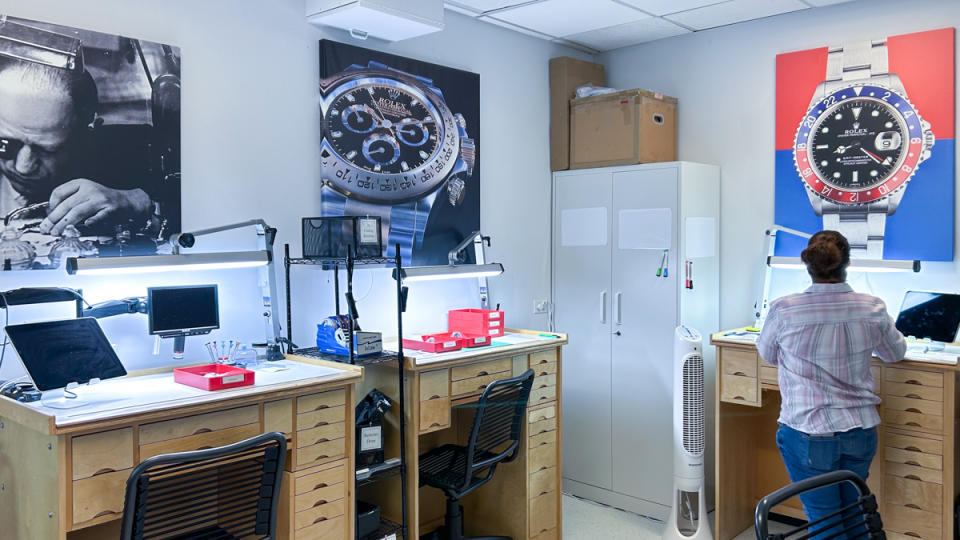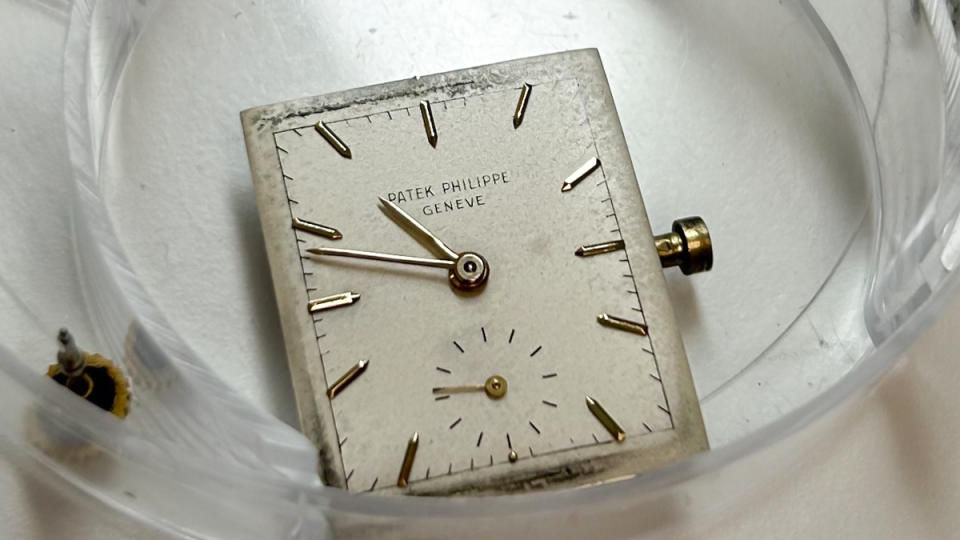The Global Watchmaker Shortage Inspired a Family-Owned N.Y.C. Shop to Open a School

The popularization of mechanical watches over the past five years will soon result in a wave of service requests that the watch industry is frighteningly ill-equipped to fulfill. According to the Employers’ Convention of the Swiss Watch Industry, which oversees the training of watchmakers, Switzerland alone will need about 4,000 more watchmakers by 2026. Expand that globally for the oncoming service load, and the picture is grim.
To fill the gap, Rolex recently opened a watchmaking school in Texas that offers free training in exchange for working for Rolex’s service department. We’ve seen Cartier refresh its watchmaking contest in what is a transparent search for talent. LVMH has done the same. And now Grand Central Watch in N.Y.C.—a three-generation family business employing nine full-time watchmakers—including master-level workers who handle the most delicate and complicated watches—is going to open its own school.
More from Robb Report
Bryson DeChambeau Won the U.S. Open With a Rolex Submariner 'Bluesy' on His Wrist
Pre-Owned Rolex Prices Just Keep Falling-Here Are the Best Deals Right Now
TAG Heuer and Porsche Just Dropped a New Carrera Chronograph
I sat down to talk with Grand Central Watch’s owner, Steve Kivel, as well as two of the shop’s master watchmakers, Wilson Massache and Oscar Raggi. Massache and Raggi are industry veterans who have worked at the highest level in Europe and here in the U.S.. Massache was with Breguet for nearly 20 years, and Raggi trained in Switzerland and has worked for a bevy of prestigious brands in his long career.

When the crisis of watch service and repairs came up, Kivel, a native New Yorker with a quick wit, lifted his arm way over his head like he was going to make a hook shot and said, “a tsunami of watch repairs is about to crash down.” Speaking of the pandemic watch boom, Kivel goes on to say, “everybody and their mother got a check and had to stay home. . .and all of a sudden they have some extra money in their pocket. They started buying luxury goods and everything disappeared. You couldn’t get a watch. So then the secondary market exploded. And everybody bought everyone’s inventory. And I’m not just talking about Rolex and Patek Phillipe anymore. I’m talking Breitling, IWC, Jaeger-LeCoultre, anything anybody could get their hands on, because they just wanted a watch.”
As for the N.Y.C. location, Kivel says that, “Unfortunately, there’s nothing really on the East Coast that is accessible to people. You have to travel to Texas or different parts of the country, which [is difficult] when you’re younger, because you may still live at home. It’s a big deal to go and live somewhere else and have to support yourself.” Kivel explains that, “our school is going to be free. The school will be a nonprofit…[and] the idea is to make watchmakers.”
Becoming a watchmaker at any level is neither easy, quick, nor well-suited to a wide swath of human temperaments. Basic service-level watchmakers develop highly specialized skills through rigorous training. Becoming a “master watchmaker”—who can fix a complicated watch or fabricate small parts for rare vintage watches—requires years of strained muscles, eyes, and (some will tell you) psyches. And yet, Kivel and his team will eventually offer a third year of training that will bring select students toward the highest levels of the craft.

The impending tsunami Kivel describes in part derives from the use of synthetic oils in modern watches. In an older watch, gunked up natural oils are certainly not ideal, but they do remain in place as a buffer between parts. Modern oils, however, are designed to evaporate, and when they do, it’s metal on metal, or metal on dry rubies. “[If] the watch has no oil, it’s going to stop or start to damage itself. If you don’t bring it in every five years, it probably will stop in the sixth or seventh year. And when those watches come, who is going to be there to fix them? Where are the watchmakers?” Kivel asks. “Even an entry-level Swiss watch today that has the most basic Swiss watch movement in it, [you will wait] maybe six months to get your watch back, because the manpower is not there.” Returning to his analogy, he says, “So when we talk about a tsunami, that’s what I mean: A tsunami of repairs that will be crashing. . .in the next 12 to 24 months. And these watches are too important and too expensive to not repair.”
As for the plan to offer a longer program at their school, Kivel emphasizes the need for high-end master watchmakers, an urgency he feels in New York as his team restores some of the most delicate and valuable watches in the world, with many headed to auction. “[M]ost of these watch schools now are running one-year programs. The one-year program is making a very basic watchmaker. From that point, the company could take them and train them just for their brand, maybe the same caliber that they’ll do for the next two to three years. But the old way in the industry is. . .a two-year program.” Kivel says his vision for Grand Central Watch school is to offer a third year, which, he points out, has never been done in the U.S.

When I asked about the capacity for the school, Kivel said he plans to take about 12 students full time at first, and that for the master program which includes a third year, perhaps just two students at a time. Regarding more complicated and vintage watches, Massache laments, “[W]hat’s going to happen in five years or 10 years [as watchmakers retire]? There’ll be no one to do these watches if we don’t share the data and the knowledge that we have. So yeah, we’re gonna be in big trouble. So that’s why Steve and I and Oscar, we want to establish the school.”
Raggi picks up the thread, “And some of them are thinking about even retiring now, like our own guys. Yeah, but it’s like, okay, but would you be interested maybe in coming in and teaching a class or two? [We need to do this] before they’re gone forever. Waiting any longer is not going to be good, because we are really going to get slammed, and we may start losing time to put this thing together. It’s the calm before the storm.”
Best of Robb Report
Sign up for Robb Report's Newsletter. For the latest news, follow us on Facebook, Twitter, and Instagram.

 Yahoo News
Yahoo News 
